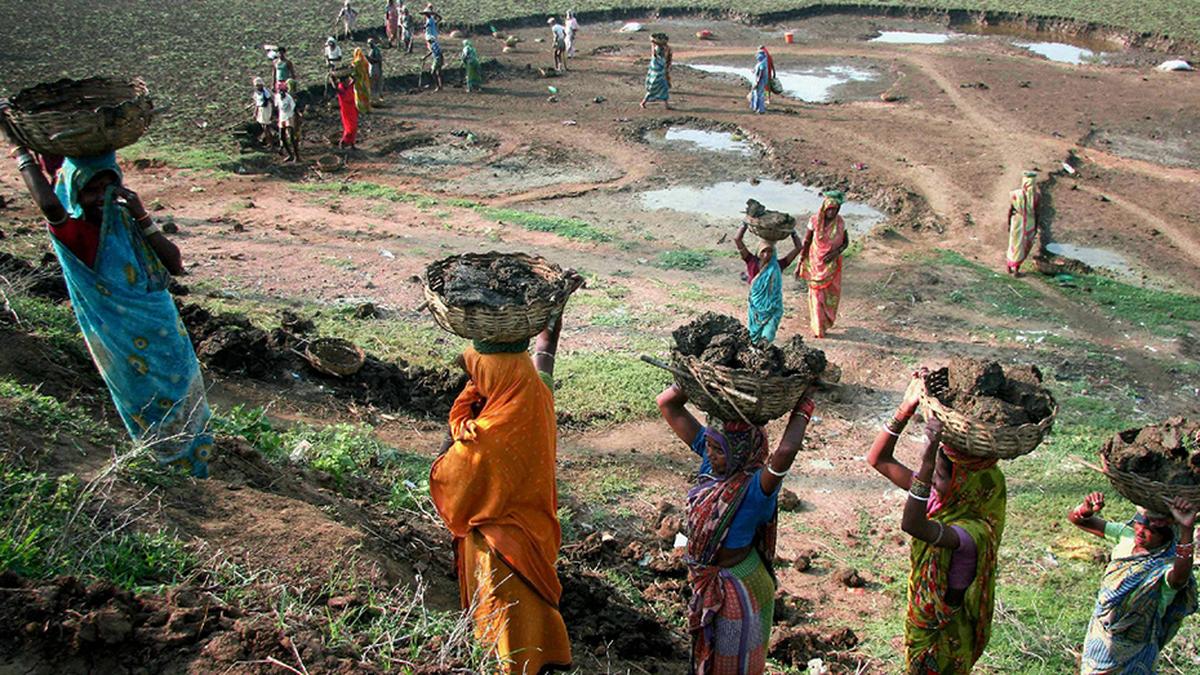Village women work under MGNREGA scheme at Jagannath Prasad village in Odisha
| Photo Credit: Gerra Madhusudan 10751@Chennai
The share of the Union Budget allocated for the social sector has declined rapidly in recent years. Data show that the outlays to most schemes under the rural development, education, health, and social welfare heads have either declined or stagnated.
Table 1 shows the allocations for various social sectors as a share of the total Budget.
Expenditure on health as a share of the total Budget declined from 2.47%-2.22% in the FY18-22 period to 1.85%-1.75% in the FY23-25 period. The share of the total Budget allocated to the Ministry of Rural Development did not cross the 6%-mark in the last three years, which was the case for many years prior.

Similarly, allocations for higher education as a share of the total Budget declined from the 1.57%-1.37% range in FY17-20 to 1.27%-0.88% in FY21-25. Allocations for school education declined from the 2.18%-1.96% range to 1.61%-1.23% and allocations for social welfare schemes declined from the 1.89%-1.61% range to 1.17%-0.97% in the same period.
The reduced allocations can be better understood at the scheme level. Table 2 shows the allocations for various social sector schemes as a share of the total Budget.
Notably, allocations for schemes such as the Mahatma Gandhi National Rural Employment Guarantee Scheme (MGNREGS), introduced under the United Progressive Alliance government, have declined significantly over time.
The ₹86,000 crore (Budget Estimates) allocated for MGNREGS for 2024-25 formed only 1.78% of the total Budget, a 10-year low. Latest data show that the Rural Development Ministry was short of ₹4,315 crore, which resulted in a delay in the disbursement of wages to MGNREGS workers.

Allocation for the national social assistance programme, which includes old age pension, widow pension, and disability pension, has declined as a share of the total Budget from the range of 1.21%-0.36% in the years FY19-21 to about 0.2% in the last four years.
The allocations for the Pradhan Mantri Poshan Shakti Nirman (PM-POSHAN) scheme as a share of the total Budget declined to 0.26% in FY25 (Budget Estimates) — the lowest in the last nine years — except FY24 (Revised Estimates).

The primary objective of the scheme is to improve the nutritional status of children studying in Classes 1 to 8 in eligible schools. It was earlier known as the National Programme of Mid-Day Meals in Schools.
There were some exceptions to this trend: allocations under the Ayushman Bharat-Pradhan Mantri Jan Arogya Yojana (PMJAY), the Pradhan Mantri Awas Yojna (PMAY)-Rural, and PM Schools for Rising India (PM SHRI) as a share of the total Budget were on an increasing trend or at least stagnating. Notably, all these schemes were launched post 2014.
With the Budget for the next financial year set to be presented on February 1, it will be crucial to examine how the declining allocations for the social sector are being addressed. The sector has under its umbrella a host of important schemes, as shown in Table 3. The table shows major expenditure heads under each social sector.
The number in the table corresponds to a scheme/expenditure head’s share in each sector’s total budget. For instance, about 33% of the health budget for the current year went to a flexible pool to be used by States for their health needs and 20.6% was allocated to autonomous bodies such as AIIMS. Close to half of the rural development budget was given to MGNREGS and over 30% went to PMAY-Rural.
Source: The data for the charts were sourced from Union Budget documents
Published – January 29, 2025 08:00 am IST







